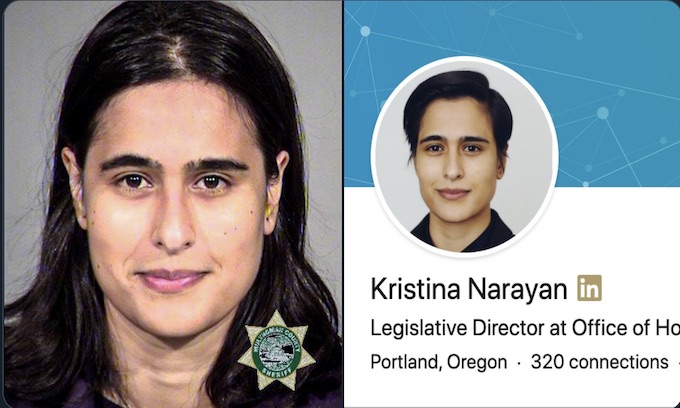Portland resident Kristina Narayan was told she would be charged with riot, disorderly conduct and interfering with a peace officer when she was placed under arrest Saturday at a protest near a police precinct in Southeast Portland.
The legislative director for House Speaker Tina Kotek, D-Portland, Narayan said she was following police orders when arrested. After prodding officers as to why she would be charged with all three, she ended up being booked into the Multnomah County Jail on interfering with a peace officer alone, making her one of a growing number of people arrested for a charge that the Multnomah County district attorney has committed to dismissing when not paired with more serious charges.
The Oregon Supreme Court has ruled the law cannot be used to charge people merely refuse to move after police tell them to.
“Freedom of expression is the foundation of our democracy,” Kotek, who expressed doubts about the legitimacy of the charge of interfering with an office long before Narayan was arrested on it. “Every person – including members of my staff – has the right to stand up for what they believe and engage in nonviolent resistance. Kristina’s experience is similar to what other Portlanders have experienced over the last few months. We need peace and accountability.”
Portland police did not immediately respond to questions about Narayan’s arrest of their use of the charge.
Kotek called for an end to what many say is an overuse of the interfering with a peace officer law after a report from The Oregonian/OregonLive detailed its broad use against homeless people and people of color.
“Let’s fix this,” Kotek said in a recent newsletter, referencing The Oregonian/OregonLive’s findings.
Sen. Floyd Prozanski, D-Eugene, is convening a work group to examine its use in policing and prosecution in Oregon. The state Criminal Justice Commission showed that interfering with a peace officer arrests increased 140% over the last decade and disproportionately targeted Black and Native American people.
Three out of four protesters arrested at Portland protests since May 28 have been charged with interfering with a peace officer. The protesters have called for an end to police violence and anti-Black racism, and interfering with a peace officer — a controversial but low-level misdemeanor that has long been ignored — has risen in profile.
Like nearly all of those, Narayan saw charges against her dropped and her record cleared.
Narayan said she thinks police view all protesters as violent and destructive, based on her observations at multiple protests. She said that people who set fires or hurt other people should be held accountable, but that the majority of protest arrests are like hers – nebulous as to what protesters did wrong other than oppose police.
“I believe it is my right to remain in place photographing or otherwise documenting what I consider to be unlawful and indiscriminate arrests,” Narayan said. “I am concerned that officers are intentionally stacking charges to dissuade protest and stifle freedom of expression that they view as non-compliant or disruptive.”
She was one of 59 people arrested Saturday night — the most of any single event in the 105 nights of demonstrations.
Portland police deployed tear gas on the crowd relatively early Saturday night after a few Molotov cocktails were thrown. as they stood and told the crowd to move north. Narayan did as instructed, she said, and started to photograph a chain of arrests as she walked.
She had taken the American Civil Liberties Union’s legal observer training and so was documenting the events of the night.
At about 11:30 p.m., she stood on the sidewalk near Ventura Park in Southeast Portland behind the police line and away from conflict when two police officers turned around and told her she was under arrest.
She replied that she was on the sidewalk and not interfering with police action. When told not to resist arrest or be met with force, she said she rendered her hands as limp as possible.
Narayan questioned why her behavior of standing on the sidewalk taking photos rose to the level of a riot charge, and if she was being charged with interfering with a peace officer for failing to disperse when told to over the police loudspeaker, why was she also being charged with disorderly conduct?
She said she received conflicting information from the arresting officers before eventually being told she would only be charged with interfering.
The charging decision from the district attorney’s office says that Narayan was arrested for not immediately leaving the area after police declared the protest an unlawful assembly. According to the statement, she told police it was possible she hadn’t heard the declaration because she was wearing headphones in her ears.
Narayan said being arrested, transported in a crowded police van and booked at the jail subjected her to risky environments during the pandemic — and that she saw people in the highest risk categories for complications or death from coronavirus arrested and treated similarly, including Black women and other people of color. She is Pacific Islander.
She was placed in a transport van with several other people. They waited in the van for quite a while, Narayan said. None of them had properly attached masks because the masks were either ripped off by police — a common tactic during arrests — or the protesters were unable to use their hands to adjust the masks properly. The van’s doors were closed and there were no windows, allowing very little ventilation between the arrestees, who were so close together their thighs were touching.
Narayan wore a respirator and was denied a paper or cloth mask, so officials allowed her to keep the respirator on until she arrived at the Justice Center, when, she said, it was taken by police, along with her cell phone, keys, license and camera.
Narayan said that she and the other arrested protesters were moved into interview rooms, elevators and other areas without masks and in close proximity, sometimes in violation of COVID-19 protocol signs she saw taped to walls.
Eventually, she was given a mask at the Multnomah County Jail, where she was booked on interfering with a peace officer.
Two days later, Mutlnomah County District Attorney Mike Schmidt dismissed her case.
Schmidt said in his charging decision that Narayan’s charges and the reasons for her arrest fit within his policy of presumptive dismissal.
“No extraordinary circumstances warrant deviation,” he wrote of Narayan’s case.
Since the protests began after the police killing of George Floyd, more than 20% of protesters arrested in Portland committed no other crime than IPO, according to the list of charges kept by the Multnomah County District Attorney’s Office. It is by far the most common protest-related charge. Since June, nearly all arrestees charged by local law enforcement agencies have been slapped with it.
Nearly half of all protesters have only been charged with the crimes Schmidt has committed to dismissing, with disorderly conduct also being one of those.
Narayan is one of 35 people Portland police arrested Saturday night solely on those charges.
Nearly 10% of Saturday night’s arrestees were charged with interfering alone. Only two of the 43 were not charged with that crime.
Oregon State Police also arrested 16 people, but their charges weren’t immediately released.
— Molly Harbarger
___
(c)2020 The Oregonian (Portland, Ore.)
Visit The Oregonian (Portland, Ore.) at www.oregonian.com
Distributed by Tribune Content Agency, LLC.
—-
This content is published through a licensing agreement with Acquire Media using its NewsEdge technology.



















Recent Comments